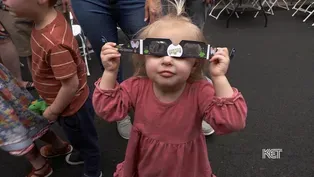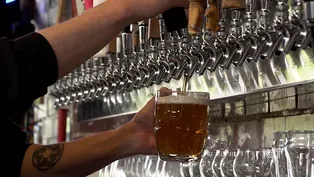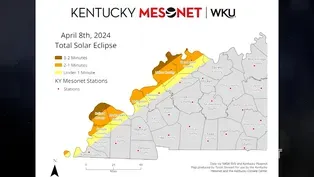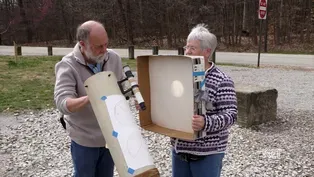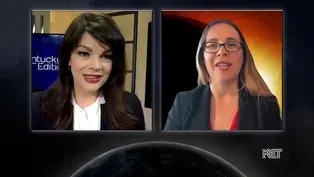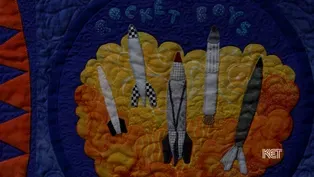Eclipse 2024: A KET Special Report
Device Tested in Kentucky Allows Blind or Visually Impaired to Experience Solar Eclipses
Clip: 4/8/2024 | 4m 30sVideo has Closed Captions
Device tested in Kentucky allows blind or visually impaired to experience solar eclipses.
The LightSound device developed at Harvard University and tested here in Kentucky, is allowing those who are blind or visually impaired to experience solar eclipses by translating changes in light into sounds.
Problems with Closed Captions? Closed Captioning Feedback
Problems with Closed Captions? Closed Captioning Feedback
Eclipse 2024: A KET Special Report is a local public television program presented by KET
Eclipse 2024: A KET Special Report
Device Tested in Kentucky Allows Blind or Visually Impaired to Experience Solar Eclipses
Clip: 4/8/2024 | 4m 30sVideo has Closed Captions
The LightSound device developed at Harvard University and tested here in Kentucky, is allowing those who are blind or visually impaired to experience solar eclipses by translating changes in light into sounds.
Problems with Closed Captions? Closed Captioning Feedback
How to Watch Eclipse 2024: A KET Special Report
Eclipse 2024: A KET Special Report is available to stream on pbs.org and the free PBS App, available on iPhone, Apple TV, Android TV, Android smartphones, Amazon Fire TV, Amazon Fire Tablet, Roku, Samsung Smart TV, and Vizio.
Providing Support for PBS.org
Learn Moreabout PBS online sponsorshipA solar eclipse is an event many experienced through sight.
But a device developed at Harvard University and tested here in Kentucky is allowing those who are blind or visually impaired to experience the celestial event as well by translating changes and lights into sounds enclosed.
In general means that everybody is part of something, right?
And in science, we want everybody to to be able to do science, to learn science, and to experience science, to appreciate science.
In the case of an eclipse is something that happens visually.
They may feel feel excluded in a way, and but through this, they can be part of the experience.
That's the great American solar eclipse happened in the U.S. and around that time I was thinking about lab accessibility.
A collaborator at the Center for Astrophysics.
Her name is Wanted is said.
She's a blind astronomer and we connected talking about lab accessibility.
Really.
But it happened to be the summer when everybody was talking about solar eclipses.
So of course, that came into our conversation.
And so we were thinking, is there a way that we could make the solar eclipse accessible to people who are blind television using sound?
And so the kind of the rice concept came to be from really that conversation.
And that summer, we built three prototype devices for the 2017 eclipse.
One was at the Kentucky School for the Blind.
Another came with me to Wyoming.
And the third device was at Morehead State University.
And I was that connection through Dr. Desmond said to bring some of these here.
And there were other scientists who had the devices in the path of totality here in Moorhead.
He was about 97.
It was 97%.
And so they wanted to collect data from different points and see whether the device will actually will actually work.
And he did.
The device has a lie detector and a little mini computer inside.
And they're doing, you know, and it essentially converts the brightness of the light into music.
So we have our eclipse and you hear getting lower pitched and that would represent that the darkest part.
When we think of eclipses or astronomy in general.
You think of visual, visually striking images, but that's not the only way to interpret those images.
You know, in fact, a lot of the images we see online are of wavelengths that are I can't even see.
So in X-ray or UV.
So so it's really just interpretation.
My purposes, the experience of having people realize, you know, we can include people in a nice, cool event if we think carefully and we plan ahead and we use some technology.
So the device itself has two kind of designs.
One one that we called Wired and one that we call the printed a PCB.
Grant paid for the components for the programing for all of the information to be free.
You can download the how the wires go, the list of components, the software, so that if you have a group of people, you can build them or you can send them already pre-built and preprogramed to to all of these places.
These workshops give us an opportunity to to bring people in that are wanting to participate in this project in some way.
It gives us a chance to teach people a new skill like soldering, and they're able to give back to the communities by helping us build these devices and then we're donating these devices back into the community.
So it's really a super rewarding project in a lot of ways and it's just been awesome to see how much, you know, people and communities are ready to jump in and help help this project in this effort.
The Light Sound Project is asking people to send in data they collected during the event, along with photos, videos and stories up there.
Eclipse Experience.
It'll be placed on a site where anyone can go to learn more about eclipses.
Pretty cool.
In the Path of Totality, Paducah celebrates the 2024 Total Solar Eclipse Event
Video has Closed Captions
How the city of Paducah is celebrating the historic 2024 solar eclipse event. (2m 23s)
Kentucky Breweries Partner to Make Special Beers for the 2024 Solar Eclipse
Video has Closed Captions
Kentucky breweries partner to make special beers for the 2024 Solar Eclipse. (2m 51s)
Kentucky Mesonet and Climate Center Track Weather Changes Created by the Eclipse
Video has Closed Captions
Kentucky Mesonet and Climate Center track weather changes created by the eclipse. (3m 2s)
Meet a Kentucky Stargazer Who was Ready to Go the Distance for the Eclipse
Video has Closed Captions
Meet a Kentucky stargazer who was ready to go the distance for the celestial show. (2m 45s)
NASA’s Eclipse Experiments and How We Might Benefit Down Here on Earth
Video has Closed Captions
NASA’s eclipse experiments and how we might benefit down here on Earth. (3m 38s)
Why An Astronaut's Work is Being Showcased at the National Quilt Museum
Video has Closed Captions
Why an astronaut's work is being showcased at the National Quilt Museum. (4m 1s)
Providing Support for PBS.org
Learn Moreabout PBS online sponsorshipEclipse 2024: A KET Special Report is a local public television program presented by KET
